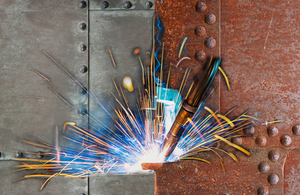Innovation sought to integrate advanced materials onto military platforms
This Defence and Security Accelerator (DASA) competition is looking for innovative joining technologies that enable the use of advanced materials and/or designs on military platforms in land, sea and air environments.

a spark
The UK and Australia continue to seek further innovation in joining technologies with a new funding opportunity to enable the integration of advanced materials onto military platforms. Such materials can offer significant benefits to military capability, including increased functionality and improved survivability. To enjoy these benefits, advanced materials often need to be used within existing designs or retro-fitted onto current platforms.
Phase 1 of the DASA “Joint Effort” themed competition was launched in November 2018 in support of the Dstl Materials for Strategic Advantage Programme. It was run in parallel with the Australian Defence Science and Technology Group (DST Group) Next Generation Technologies Fund (NGTF) and Small Business Innovation Research for Defence (SBIRD). Proposals were received from industry and academia and 14 projects were funded, split evenly between the Australian and British competitions.
In Phase 2, the campaign is seeking to increase collaboration between the two nations, building both on innovations from Phase 1 and exploring entirely new concepts.
The technical challenges remain unchanged from Phase 1. Many different materials are within scope, including joining combinations of composites, metals, ceramics and polymers. Potential joining solutions should provide enhanced capability through one of the following:
- improved performance through use of new material combinations or structural designs
- improved durability of structures through better joints
- improved ability to maintain joints through the life of the military platform
Phase 2 has £500k available through DASA to fund multiple proposals. In parallel, there is a separate competition for Australian bidders with funding of an additional A$1m. It is not compulsory to have been involved in the previous phase to apply.
The full competition document can be found here.
Phase 2 will close for submission of proposals at midday (GMT) on Friday 31 January 2020.